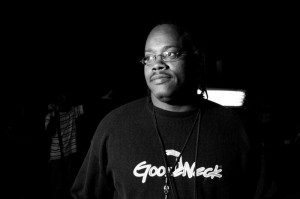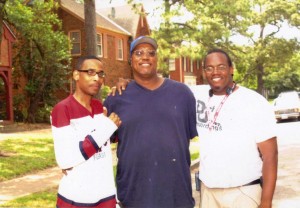
It goes without saying that the J.R. Richard story is almost totally unknown now. A big league pitcher who dominated baseball until a stroke ended his career and almost took his life, Richard was an imposing figure on the mound as in real life. At 6’8”, he struck out over 300 batters twice in the late 1970s for the Houston Astros and was considered one of baseball’s premier pitchers. But his earnings were mishandled, and after the premature end to his career at age 30, Richard’s life dwindled to the point where he was homeless, living under a Houston freeway overpass. That the team to whom he brought success disregarded him – Richard’s number 50 has not yet been retired by the Astros – was almost as shocking as the near total absence of media coverage about Richard since he involuntarily retired.
That is, until filmmaker Greg Carter recently stepped in. Carter, a Houston native, had known about Richard from his playing days, but he too had not been privy to what happened to the pitcher since the end of his playing days in 1980. “I always thought that JR Richard was a fascinating guy,” Carter stated by phone from his current Los Angeles base. “When I was a little kid in third grade, we would pretend to be J.R. Richard. I was a fan, but when I got into it, there were a lot of things about his character to make it really a story to be told.”

When Carter was in post on a movie in Los Angeles My Big Phat Hip Hop Family, he discovered a producer in Houston who wanted to do a film about Richard, but Carter was hesitant at first. “I thought it was a tough call because it would be a period piece,” Carter stated, “but I said that we would have to go small – no big scenes. We would make a character-driven piece about this guy.”
Diligent research and a meeting with Richard himself convinced Carter to make the film, whose actual tale could be as compelling on film as, for example, the one in Rudy or Raging Bull. “JR was unadulterated power,” he said of the personal meeting. “Just how big his hands were – like you or me holding a golf ball. Standing next to him, I felt small, and I’m 6’5”.”
Shortly, Carter joined the project, which would go on to be titled Resurrection: The JR Richard Story, and would focus on the redemptive aspects of Richard’s downward spiral during and after his peak baseball years, which were arguably just beginning when Richard went down. “I am the son of a preacher,” Carter said, finding a connection to the material. “I think he was proud and would never ask for everything although people [mistook] his pride for arrogance and defiance.”

In Carter’s film, Richard’s literal rebirth is a key to the story and how the future may play out for Richard. “In the end, there will be a reconciliation with the Astros,” Carter predicted. “He should be a Hall-of-Famer. The organization that you played for should be at the forefront and push it. You have billionaires who own the teams and have millionaires on the field. By the time we get to another owner, I can see the Astros getting him into the Hall of Fame.”
In hindsight, Carter saw his film as a symbol for how athletes enter the professional ranks then decline in the American system due to injury or financial misconduct, both of which happened to Richard. “So many athletes, after their playing days, they are broke,” he reflected. “It’s not just the JR story. It’s a cautionary tale – how things could happen like this. It’s a travesty. As it is, he’s not asking for a handout. He’s just asked to be treated fairly. It was something that never should have happened the way it did.”
Since the triumphs of his film, Carter, a student of Shakespeare, created a modern version of Romeo and Juliet set amongst black and Latino gangs entitled A Gangland Love Story. He next produced Dysfunctional Friends, which he described as “a black version of The Big Chill.” Making his projects consistently for under $500,000, Carter’s next film which he wrote and will directed is called Monica and features a love triangle that takes place against the backdrop of a gentleman’s club.





